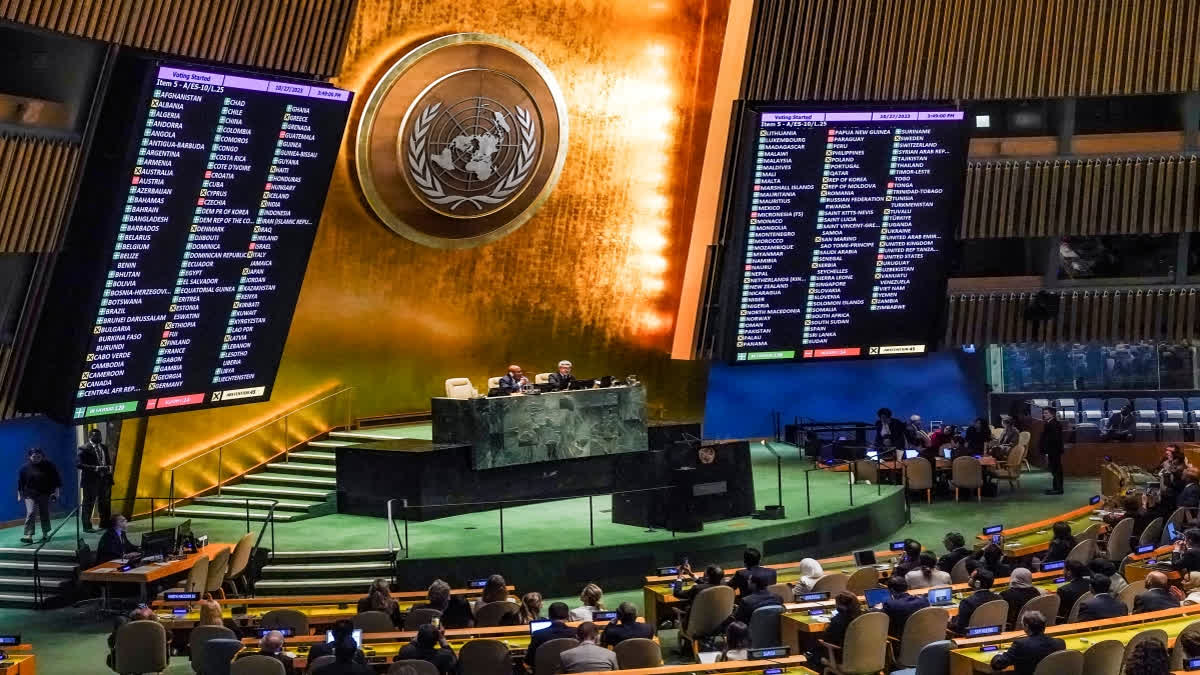United Nations: The U.N. General Assembly approved a nonbinding resolution Friday calling for a "humanitarian truce" in Gaza leading to a cessation of hostilities between Israel and Gaza's Hamas rulers, the first United Nations response to the war.
The 193-member world body adopted the resolution by a vote of 120-14 with 45 abstentions after rejecting a Canadian amendment backed by the United States. It would have unequivocally condemned the Oct. 7 "terrorist attacks" by Hamas and demanded the immediate release of hostages taken by Hamas, which is not mentioned in the Arab-drafted resolution.
Riyad Mansour, the Palestinian U.N. ambassador, called the General Assembly "more courageous, more principled" than the divided U.N. Security Council, which failed in four attempts during the past two weeks to reach agreement on a resolution. Two were vetoed and two failed to get the minimum nine "yes" votes required for approval.
Israel's U.N. Ambassador Gilad Erdan called it "a day that will go down in infamy," saying after the vote: "Israel will not stop the operation until Hamas terror capabilities are destroyed and our hostages are returned. … And the only way to destroy Hamas is root them out of their tunnels and subterranean city of terror."
Frustrated Arab nations went to the General Assembly, where there are no vetoes, to press for a U.N. response, and United Arab Emirates Ambassador Lana Nusseibeh, the Arab representative on the Security Council, expressed delight at the result. "120 votes in this kind of geopolitical environment is a very, very high signal of the support for international law, for proportionate use of force, and it is a rejection of the status quo that is currently happening on the ground," she said.
The 14 countries that voted against the resolution include Israel and its closest ally, the United States, five Pacific island nations and just four European countries — Austria, Croatia, Czechia and Hungary. Most European countries voted yes or abstained. Mansour said the European votes indicate they can be "very helpful" in pursuing a Security Council resolution "or in maximizing pressure in Israel to stop this war."
While the surprise Hamas attacks killed some 1,400 Israelis, more than 7,000 Palestinians have been killed in Israel's retaliatory airstrikes, according to the Gaza Health Ministry. The escalating death toll and destruction in Gaza has heightened international support for "humanitarian truces" to get desperately needed food, water, medicine and fuel to the 2.3 million people in Gaza.
Unlike Security Council resolutions, General Assembly resolutions are not legally binding but the UAE's Nusseibeh told reporters "they carry incredible weight and moral authority." She said the 10 elected Security Council members, who serve two-year terms, will take the "moral authority" from the General Assembly and try to break the gridlock on a council resolution.
-The votes came part way through a list of 113 speakers at an emergency special session of the General Assembly on Israeli actions in occupied Palestinian territories. Jordan's U.N. Ambassador Mahmoud Hmoud, speaking on behalf of the U.N.'s 22-nation Arab group, called for action on the resolution because of the urgency of the escalating situation on the ground.
